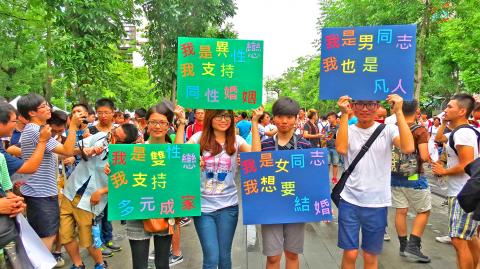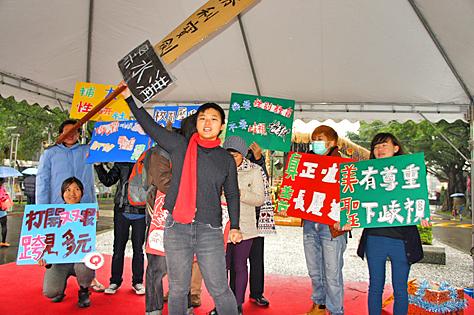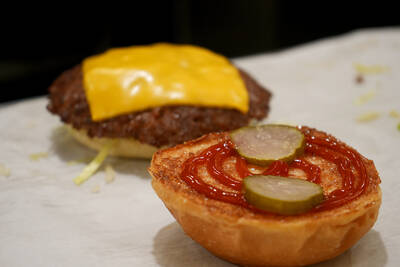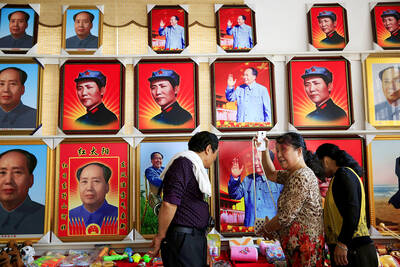Having a romance, joining a school club and getting a part-time job are said to be three required courses for all Taiwanese university students. Since the academic year has just begun, it is time again for students to choose a club to join. For lesbian, gay, bisexual and transgender (LGBT) students, however, universities continue to use technicalities to block the establishment of LGBT student clubs.
As the Gender Equity Education Act (性別平等教育法) states: “Schools shall provide a gender-fair learning environment, respect and give due consideration to students, faculty, and staff with different gender, gender temperaments, gender identity, and sexual orientation.”
The fact that the government and schools fail to ensure a fair learning environment for all has clearly highlighted the necessity of such clubs.

Photo: Su Ching-feng, Taipei Times
BUILDING FRIENDLY CAMPUSES
The nation’s first gay student club, NTU GayChat (台大男同性戀社), was established by National Taiwan University (NTU) students in 1993. Although the school approved their application, it forced them to name it “gay issues study club” (男同性戀問題研究社) at first, so as to spin it as an academic group to reduce controversy.
Two years later, students established NTU Lambda (台大浪達社), the nation’s first lesbian student club. To avoid drawing too much attention at school, the club was named after the Greek letter “λ” (lambda) — an international symbol for LGBT rights. By doing so, faculty and students would not know instantly that it is a lesbian group.

Photo: Lai Hsiao-tung, Taipei Times
“The club is meant to build a friendly environment for gay students, whether members or not,” said GayChat secretary Little Jie (小杰), a pseudonym, during a television interview, adding that straight students are welcome too.
The club provides lectures on various LGBT issues every Friday and some leisure activities at the beginning and end of each semester. It also holds birthday parties for members regularly to create a friendly atmosphere.
In June 1995, GayChat and Lambda jointly launched the first Gay and Lesbian Awakening Day (GLAD, 校園同志甦醒日) campaign to raise awareness on campuses across Taiwan. In recent years, many LGBT student clubs at different universities have taken turns organizing the annual GLAD party in May or June, along with LGBT forums, film festivals and other activities, while forming a student non-governmental organization.
Meanwhile, the Internet has allowed more LGBT students to create online gay and lesbian boards on the Bulletin Board Systems (BBS) of their universities, which could then be transformed into LGBT student clubs.
Over the past 20 years, club members have worked hard to protect equal rights, eliminate discrimination, oppression and bullying, push for gay-friendly legislation, promote safe sex and develop educational materials through their groups. Also, they have actively participated in and contributed to the LGBT rights movement in Taiwan outside the campus.
CHALLENGES REMAIN
Today, many universities and some senior high schools have their own LGBT student clubs, both official and unofficial. However, operating these clubs is not easy, even at more liberal schools like NTU.
Chen Ling (陳凌), a former Lambda president, says that many gay and lesbian students fear coming out due to family, school and social pressure.
“A member once asked me to keep my voice down during our conversation at school, worrying that teachers and schoolmates would find out that she is lesbian,” Chen says.
And some school officials are against LGBT students and clubs. When National Chengchi Universty (NCCU) students established the NCCU Lu Ren Jia LGBTQQIA Club (政大陸仁賈) in 1997, they would occasionally hold on-campus activities using the name of another club to avoid school interference. Although the situation has gradually improved, members complain that some school employees refuse to help them promote club affairs.
The unfavorable situation facing LGBT students can be worse at universities funded by religious groups. In 2013, almost 100 LGBT students staged a protest at Fu Jen Catholic University (FJU) after Taiwan’s 17 Catholic and Christian universities issued an open letter opposing same-sex marriage. They also accused the school of denying their application for establishing gay and lesbian student clubs, which have operated underground for years.
Last year, FJU’s “unofficial” lesbian student club planned to hold a speech. But school officials quickly tore down the posters before the event because they were worried that the speaker would “teach the audience how to become homosexual.”
At a time when student clubs recruit new blood, university officials are violating the Gender Equity Education Act if they continue to harass or ban LGBT student clubs. The Ministry of Education could improve the situation by including this in their school evaluations.
A more effective way would be for members of LGBT student clubs to actively join gender equality committees and students’ associations so as to make their voices heard, while pushing for reform within the school system. Hopefully that would speed up the creation of a fair learning environment for all.

Taiwan can often feel woefully behind on global trends, from fashion to food, and influences can sometimes feel like the last on the metaphorical bandwagon. In the West, suddenly every burger is being smashed and honey has become “hot” and we’re all drinking orange wine. But it took a good while for a smash burger in Taipei to come across my radar. For the uninitiated, a smash burger is, well, a normal burger patty but smashed flat. Originally, I didn’t understand. Surely the best part of a burger is the thick patty with all the juiciness of the beef, the

The ultimate goal of the Chinese Communist Party (CCP) is the total and overwhelming domination of everything within the sphere of what it considers China and deems as theirs. All decision-making by the CCP must be understood through that lens. Any decision made is to entrench — or ideally expand that power. They are fiercely hostile to anything that weakens or compromises their control of “China.” By design, they will stop at nothing to ensure that there is no distinction between the CCP and the Chinese nation, people, culture, civilization, religion, economy, property, military or government — they are all subsidiary

This year’s Miss Universe in Thailand has been marred by ugly drama, with allegations of an insult to a beauty queen’s intellect, a walkout by pageant contestants and a tearful tantrum by the host. More than 120 women from across the world have gathered in Thailand, vying to be crowned Miss Universe in a contest considered one of the “big four” of global beauty pageants. But the runup has been dominated by the off-stage antics of the coiffed contestants and their Thai hosts, escalating into a feminist firestorm drawing the attention of Mexico’s president. On Tuesday, Mexican delegate Fatima Bosch staged a

Would you eat lab-grown chocolate? I requested a sample from California Cultured, a Sacramento-based company. Its chocolate, not yet commercially available, is made with techniques that have previously been used to synthesize other bioactive products like certain plant-derived pharmaceuticals for commercial sale. A few days later, it arrives. The morsel, barely bigger than a coffee bean, is supposed to be the flavor equivalent of a 70 percent to 80 percent dark chocolate. I tear open its sealed packet and a chocolatey aroma escapes — so far, so good. I pop it in my mouth. Slightly waxy and distinctly bitter, it boasts those bright,